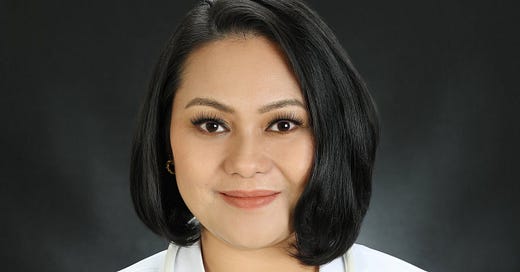In a world where dreams are often associated with youth and early beginnings, there are remarkable individuals who defy conventions and show us that it's never too late to pursue our passions.
Meet Dr. Andrea, a shining example of resilience, determination, and the unwavering pursuit of one's calling. Her story is a testament to the fact that the journey to becoming a doctor isn't limited by age or circumstance.
In our quest to unearth stories that inspire, we had the privilege of sitting down with Dr. Andrea Macachor-Mesa, a medical graduate who achieved her dream at the age of 40.
Her journey is not just about academic accomplishments, but also about the invaluable life experiences that uniquely position her as a beacon of hope for aspiring doctors who may have discovered their passion later in life.
Dr. Andrea's story reminds us that the path to becoming a doctor is not always linear; it's filled with twists, turns, and unexpected opportunities. Her journey embodies the spirit of perseverance and the unyielding desire to make a difference in the lives of patients.
So, as we dive into her narrative, let's be prepared to be inspired, motivated, and reminded that it's never too late to chase our dreams, regardless of age.
Join us in this exclusive interview as we delve into the extraordinary journey of Dr. Andrea, a living testament to the fact that the pursuit of passion knows no bounds and that dreams, no matter when they are pursued, can indeed be achieved.
“Determine what needs to be done to be able to pursue your passion”
Road to White Coat (RTWC): Your determination to achieve your medical degree at 40 is truly inspiring. How do you believe your life experience sets you apart as a future healthcare professional?
Dr. Andrea: My life experience led me to be more focused. I have experienced what it was like to work in jobs that did not give me fulfillment. so I am grateful to have found my calling even if it came later in life. I finally feel that I am at the right place so I am not taking any of this for granted. I am giving it my all. Also, at this age, I know myself better. I know how hard I can work and what I am capable of.
RTWC: When you said "I have experienced what it was like to work in jobs that did not give me fulfillment", can you elaborate on a specific scenario where you felt this?
Dr. Andrea: I used to work in a call center and I was unhappy in that job. I dragged myself to work every day. That industry was not for me and I did not see a future for myself there, it was not something I wanted to do long-term. Every day, I wanted to resign until I eventually did. In medicine, even if it is difficult and exhausting, I find joy and fulfillment in what I do. Even when things get challenging, I do not think of quitting.
RTWC: With your unique journey, you must have developed exceptional resilience. How do you handle high-pressure situations and maintain a healthy work-life balance?
Dr. Andrea: I just focus on what's in front of me, on what needs to be done at the moment, because whatever it is, it will pass.
I'll admit that I didn't have a healthy work-life balance during med school. I was either in med student mode or housewife mode at any given time, and both were equally tiring and demanding. Any free time I had was spent resting/recovering/sleeping. Now that I'm a medical intern, my schedule is more forgiving, and I'm trying to actively devote more time to myself.
RTWC: What advice would you give to others who may be considering a career change to pursue their passion, regardless of age?
Dr. Andrea: If it's something that you truly want to do, go for it. It took me several years from deciding that I wanted to study medicine to finally deciding to take the NMAT. I kept waiting for the right time until I realized that there was not going to be the right time, so I just went for it.
Of course, I am aware that I am privileged to have the support I needed to be able to pursue my passion--my parents were willing to pay my tuition while my husband was willing to support me in everything else. I know that not everyone has the same privilege.
If a career change is not yet feasible now, plan for it accordingly. Determine what needs to be done to be able to pursue your passion. Set a timeline, then work on getting towards your goal. Don't give up on your dream.
RTWC: Lastly, what aspects of medicine are you most excited about as you embark on this new chapter of your career?
Dr. Andrea: I am excited to see how far I can go. At this point, I am still planning on going into residency and beyond. I know that my middle-aged body is no longer in the best condition to go into residency training, but who knows? I already went against odds to get to this point. I'm excited to see what the future holds.

The invaluable advice she shares for those considering a career change to pursue their passions later in life echoes in our minds: "Embrace the journey, trust your instincts, and never underestimate the value of your life experiences."
Dr. Andrea's story reminds us that every step we take contributes to our growth, and that it's never too late to embark on a fulfilling and meaningful journey.





